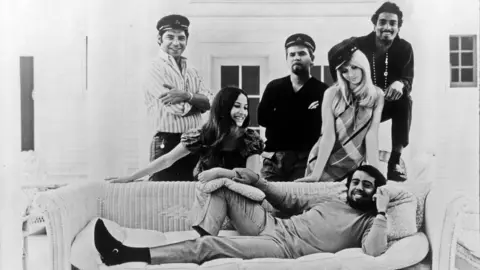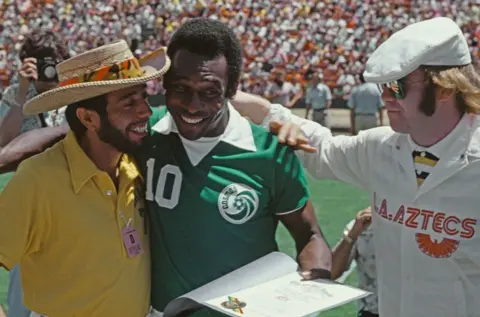 Getty Images
Getty ImagesBrazilian musician Sérgio Mendes has died at the age of 83, his family has confirmed.
The bandleader and songwriter is best known for the upbeat Latin pop song “Mas Que Nada,” and has added Brazilian touches to English-language songs such as “The Look Of Love” and The Beatles’ “The Fool On The Hill.” .
Mendes has recorded more than 35 albums, many of which have been certified gold or platinum in the United States; in 2012, he was nominated for an Oscar for co-writing the song “Real in Rio” from the animated film Rio.
Mendes “passed away peacefully” on Thursday in Los Angeles, surrounded by his wife and children, his family said in a statement.
No official cause of death was given, but Mendes’ family said he had suffered from COVID-19 for a long time, and the musician was reported to have been suffering from the respiratory illness since late 2023.
The family’s statement said Mendes “brought the joyous sounds of his native Brazil to the world.”
“Mendes last performed in November 2023 in sold-out venues in Paris, London and Barcelona,” the statement continued.
“Over the past few months, his health has been challenged by the effects of long-term COVID-19.”
The statement concluded by saying that Mendes “has left us an incredible musical legacy through more than six decades of unique sound.”
sun kissed hits
The son of a doctor, Mendes was born in Niterói, Brazil, where he initially studied classical piano and aspired to become a concert pianist.
But his life changed in 1956, when he heard American musician Dave Brubeck’s first jazz record, “Take Five,” and gave up his studies.
“For me, I would say, that was one of the incredible moments of my life,” In 2014, he told NPR“Because when I heard the news, I didn’t know anything about jazz or anything.”

When the bossa nova craze took off, he began performing in nightclubs in Rio de Janeiro and began to immerse himself in that scene alongside other luminaries such as Antonio Carlos Jobim and João Gilberto.
His first record, Dance Moderno, was released in 1961 on Philips Records.
Three years later, he left Brazil for the United States to escape military dictatorship—but it was not an easy transition.
His Brazilian bandmates returned home, forcing Mendes to form a new band. It was called Brasil ’66 and starred two American singers, Lani Hall and Karen Philip.
Signed to A&M Records, they found a winning formula – combining jazzy renditions of Brazilian pop songs with samba-rich versions of current hits.
their first major success but nothinga sun-kissed cover of Jorge Ben’s original, full of finger clicks, rocking rockers and impassioned choruses that sing out the urge to dance.
Mendes later recalled, “There was something very magical about the song.” “People all over the world love this song.”
It was the first Portuguese-language song to become a worldwide hit; and propelled Brasil ’66’s self-titled debut album into the top ten on the US charts.
 Getty Images
Getty ImagesMendes perfected the blend of Western melodies and Brazilian rhythms on later recordings, including Simon and Garfunkel’s “Scarborough Fair” and Otis Redding’s “Dock of the Bay.”
When he covers Beatles songs fool on the mountain On the 1967 album Look Around, Paul McCartney wrote a letter to Mendes telling him it was his favorite version of the song.
Although his music was dismissed as “easy listening” at the time, he became extremely popular, touring on stage and performing at the White House for Presidents Lyndon Johnson and Richard Nixon.
He frequently appeared on television shows with artists such as Perry Como, Jerry Lewis, Fred Astaire and Frank Sinatra, with whom he developed close friendships.
In the 1970s he re-formed his own band Brasil ’77, but his commercial fortunes gradually waned until his 1983 comeback album Sergio Mendes gave him the biggest hit single of his career – a cover of Dionne Warwick’s classic songs Will never let you go.
The song’s success was almost accidental, with Mendes adding the song to his repertoire at the last minute.
“Every other song on the album was very festive. I needed a ballad on the album just to change the pace a little bit,” he told Billboard’s Adult Contemporary Hot Songs chart.
 Getty Images
Getty ImagesIn 1992 he won a Grammy Award for the album Brasileiro, which included several tracks with the young percussionist and singer Carlinhos Brown, now one of Brazil’s most famous musicians.
Their collaboration includes magalenha – a joyful song driven by the energetic sounds of Bahian percussionists from the streets of Rio – quickly became a Latin standard.
Twenty years later, in 2012, the pair received an Oscar nomination for their score for Rio.
 Getty Images
Getty ImagesThe inclusion of “Mas Que Nada” on the 1997 soundtrack of Mike Myers’ Austin Powers introduced Mendes to a whole new audience, and by the early 2000s, his Some of the past titles have been re-released for new fans.
Around the same time, Mendes began incorporating elements of hip-hop into his sound, collaborating with the Black Eyed Peas on a new version of Mas Que Nada and recording songs with rappers such as Common and Q-Tip.
Mendes also made a cameo in Pharrell Williams’ 24-hour “Happy”; and received a Lifetime Achievement Award at the 2005 Latin Grammy Awards.
Sergio Mendes in the film of his life, Key to Joy – released alongside a new album in 2020 – has only recently continued to play live, including at the London Jazz Festival last October.
Mendes sums up his musical philosophy once said: “When I think of Brazilian music, the first words that come to my mind are joy, celebration, party… I think that’s in line with the general spirit of the people.”
The musician is survived by his wife Gracinha Leporace, who sang on many of his recordings. He also has 5 children.


